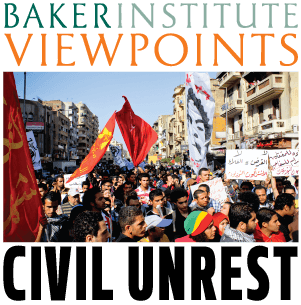 In light of the radical changes in the Middle East and North Africa following the Arab Spring, civil unrest has become an issue of utmost concern for policymakers, analysts and academics. Nowhere can the implications of ignored or improperly addressed public discontent be seen more clearly than in Syria’s brutal and potentially regionally destabilizing civil war. Widespread protests are also disrupting — and even overturning — the status quo in Brazil, Turkey and Egypt. In the second of a seven-part Baker Institute Viewpoints series, we evaluate the impact that this new wave of civil unrest will have on international politics. In the coming days, institute experts will address the effects on U.S. foreign policy, unexpectedly stable regimes, analytical tools for understanding civil unrest and political philosophical conceptions of “just” societies.
In light of the radical changes in the Middle East and North Africa following the Arab Spring, civil unrest has become an issue of utmost concern for policymakers, analysts and academics. Nowhere can the implications of ignored or improperly addressed public discontent be seen more clearly than in Syria’s brutal and potentially regionally destabilizing civil war. Widespread protests are also disrupting — and even overturning — the status quo in Brazil, Turkey and Egypt. In the second of a seven-part Baker Institute Viewpoints series, we evaluate the impact that this new wave of civil unrest will have on international politics. In the coming days, institute experts will address the effects on U.S. foreign policy, unexpectedly stable regimes, analytical tools for understanding civil unrest and political philosophical conceptions of “just” societies.
Read other posts in this series:
- Turkey, Brazil and Egypt: The stakes for the United States by Joe Barnes, Bonner Means Baker Fellow
- Chaos in the streets? Blame cyberspace! by Chris Bronk, fellow in information technology policy
- What civil unrest in Brazil portends for the international system by Nathan Jones, postdoctoral fellow in drug policy
- Civil unrest: Is Mexico next? by Tony Payan, fellow in Mexico studies
- A new wave of democracy in Turkey by Dina Shahrokhi, research associate for the Middle East
- Egypt after the coup: Only the beginning of the beginning by Albert B. Wolf, doctoral candidate at the University of California, Irvine
The abrupt removal of Egypt’s Muslim Brotherhood from government brings the Arab Spring full circle. Just as the downfall of Hosni Mubarak on Feb. 11, 2011, galvanized protest movements across the Arab world, the sight of the military intervention to bring down Egypt’s first democratically elected government signals a return to the status quo. Egypt again finds itself under temporary military rule albeit in a very different regional context from 2011. Contagious revolutionary fervor has faded as successor regimes across North Africa have failed to deliver quick or lasting improvements in governance. The civil war in Syria, radicalization of militia groups in Libya and discrediting of the Muslim Brotherhood as a governing alternative in Egypt has strengthened the forces of status quo across the region. Meanwhile, the conservative Gulf States have succeeded in containing the political upheaval in part by using financial and military power to influence the pace and direction of change in the “new” Middle East.
The continuing political turmoil in Egypt also brings into sharp relief the relative stability in the Persian Gulf states as they prepare to play a key role in extending financial assistance to Egypt’s new rulers. The six Gulf Cooperation Council (GCC) states have survived the regional upheaval more or less intact and face a far less pessimistic situation, at least in the short term. The political unrest that rocked Bahrain in 2011 has been contained, although a comprehensive political settlement remains elusive. As the protests have lost momentum, the opposition has become splintered and — in part, at least — radicalized, making it impossible to recapture the pro-democracy overtones of 2011. In Kuwait, too, the mass demonstrations of autumn 2012 have dwindled in the face of opposition fragmentation, while protests in Saudi Arabia’s Eastern Province failed to spill over into more mainstream regions of the kingdom. The United Arab Emirates has broken up cells linked to the Muslim Brotherhood that were ostensibly targeting national security, while the Sultan of Oman remains firmly in power.
There are numerous reasons for the Gulf States’ greater resilience. On a socio-political level, the historical longevity and greater domestic rootedness of the Gulf monarchies differs significantly from the “republican dynasties” that North Africa’s ousted strongmen (and the Assad family in Syria) attempted to construct. Yet, the concept of legitimacy is vague and nebulous at best, and an artificial and misused construct at worst. Other, more material, factors underline the comparative stability in the Gulf States, such as the generous provision of public goods and services to the national population. In particular, sustained high oil prices since 2003 (with a blip in 2008-9) have allowed the major oil-producing GCC states not only to reinforce domestic stability through the redistribution of wealth to key segments of society, but also to direct resources to less-well-endowed states.
Policy responses in the Gulf States certainly targeted important constituencies in a manner that was simply not available to North African governments. Measures ranged from direct handouts of cash to the creation of thousands of new jobs in the public sector and significant increases in wages and benefits. The package unveiled by Saudi Arabia in March 2011 amounted to some $130 billion — a figure larger than every national budget up until 2007 — while similar (albeit smaller) packages were announced elsewhere. Even Qatar, with little prospect of any domestic discontent, increased public-sector pay and pensions by 60 percent in 2011, with that figure rising to 120 percent for military officers. The accrual of oil revenues from years of record budget surpluses enabled rulers to intensify the mechanisms binding state and society in the redistributive “ruling bargain.”
Externally, Saudi Arabia, the UAE and Qatar played a leading role in reshaping the contours of a region in flux, and tried to use their leverage to influence the pace and direction of change in the “new” Middle East. First in Libya and later in Syria, the Gulf States were quick to back certain opposition groups with a combination of material, men and money, as well as a swiftness of action and a lack of domestic constraints that are simply unavailable to Western powers. And although significant differences opened up among individual GCC states over policies toward the Muslim Brotherhood in Egypt and North Africa, the recent change of leadership in Qatar will likely repair GCC divisions as the new emir resets Qatari foreign policy and scales back its ideological and expansive dimensions.
This is not to suggest that the Gulf States are trouble-free. On the contrary, there are mounting signs that fiscal policies are unsustainable in the long term, and that Gulf governments lack the political will to tackle sensitive domestic challenges posed by local energy consumption and rapidly rising, break-even oil prices. Preparing for the transition to the post-oil era that will inevitably take place requires difficult political and economic choices rather than the post-2011 response of throwing money at problems. Yet, for now at least, the Gulf States have remained on top of the tumultuous upheaval that has swept the Arab world, avoided the messy and uncertain processes of political transition in North Africa, and increased their regional and international leverage in Egypt, Syria and elsewhere.
 Kristian Coates Ulrichsen, Ph.D., is the Baker Institute fellow for Kuwait. His research examines the changing position of Persian Gulf states in the global order, as well as the emergence of longer-term, nonmilitary challenges to regional security. He is also a visiting fellow at the LSE Middle East Centre and an associate fellow at Chatham House in the United Kingdom. Follow him on Twitter at @Dr_Ulrichsen.
Kristian Coates Ulrichsen, Ph.D., is the Baker Institute fellow for Kuwait. His research examines the changing position of Persian Gulf states in the global order, as well as the emergence of longer-term, nonmilitary challenges to regional security. He is also a visiting fellow at the LSE Middle East Centre and an associate fellow at Chatham House in the United Kingdom. Follow him on Twitter at @Dr_Ulrichsen.